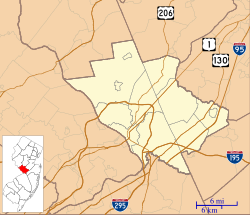 | |
| Founded | 1905 |
|---|---|
| Founder | Whitney Darrow |
| Country of origin | United States |
| Headquarters location | Princeton, New Jersey |
| Distribution | Ingram Publisher Services (Americas, Asia, Australia) John Wiley & Sons (EMEA, India) United Publishers Services (Japan)[1] |
| Publication types | Books |
| Official website | press |
Princeton University Press | |
 | |
| Location | 41 William Street, Princeton, New Jersey |
| Coordinates | 40°20′59.8″N 74°39′13.3″W / 40.349944°N 74.653694°W |
| Built | 1911 |
| Architect | Ernest Flagg |
| Architectural style | Collegiate Gothic |
| Part of | Princeton Historic District (ID75001143) |
| Added to NRHP | 27 June 1975 |
Princeton University Press is an independent publisher with close connections to Princeton University. Its mission is to disseminate scholarship within academia and society at large.
The press was founded by Whitney Darrow, with the financial support of Charles Scribner, as a printing press to serve the Princeton community in 1905.[2] Its distinctive building was constructed in 1911 on William Street in Princeton.[3] Its first book was a new 1912 edition of John Witherspoon's Lectures on Moral Philosophy.[4]
YouTube Encyclopedic
-
1/5Views:19 26814 9516 3787 2891 124
-
Follow us at Princeton University Press #subscribe #Ideas
-
Gods and Robots: Myths, Machines, and Ancient Dreams of Technology, Adrienne Mayor
-
Paul J. Nahin talks about books he has written for Princeton University Press, and their covers
-
Steven S. Gubser discusses his Little Book of String Theory
-
Panel on Richard Alba’s The Great Demographic Illusion (Princeton University Press, 2020)
Transcription
History
Princeton University Press was founded in 1905 by a recent Princeton graduate, Whitney Darrow, with financial support from another Princetonian, Charles Scribner II. Darrow and Scribner purchased the equipment and assumed the operations of two already existing local publishers, that of the Princeton Alumni Weekly and the Princeton Press. The new press printed both local newspapers, university documents, The Daily Princetonian, and later added book publishing to its activities.[5] Beginning as a small, for-profit printer, Princeton University Press was reincorporated as a nonprofit in 1910.[6] Since 1911, the press has been headquartered in a purpose-built gothic-style building designed by Ernest Flagg. The design of press's building, which was named the Scribner Building in 1965, was inspired by the Plantin-Moretus Museum, a printing museum in Antwerp, Belgium. Princeton University Press established a European office, in Woodstock, England, north of Oxford, in 1999, and opened an additional office, in Beijing, in early 2017.
Pulitzers and other major awards
Six books from Princeton University Press have won Pulitzer Prizes:
- Russia Leaves the War by George F. Kennan (1957)[7]
- Banks and Politics in America from the Revolution to the Civil War by Bray Hammond (1958)[8]
- Between War and Peace by Herbert Feis (1961)[9]
- Washington: Village and Capital by Constance McLaughlin Green (1963)[10]
- The Greenback Era by Irwin Unger (1965)[11]
- Machiavelli in Hell by Sebastian de Grazia (1989)[12]
Books from Princeton University Press have also been awarded the Bancroft Prize, the Nautilus Book Award, and the National Book Award.
Papers projects
Multi-volume historical documents projects undertaken by the press include:
- The Collected Papers of Albert Einstein
- The Writings of Henry D. Thoreau
- The Papers of Woodrow Wilson (sixty-nine volumes)
- The Papers of Thomas Jefferson
- Kierkegaard's Writings
The Papers of Woodrow Wilson has been called "one of the great editorial achievements in all history."[13]
Bollingen Series
Princeton University Press's Bollingen Series had its beginnings in the Bollingen Foundation, a 1943 project of Paul Mellon's Old Dominion Foundation. From 1945, the foundation had independent status, publishing and providing fellowships and grants in several areas of study, including archaeology, poetry, and psychology. The Bollingen Series was given to the university in 1969.
Other series
Sciences
- Annals of Mathematics Studies (Alice Chang, Phillip A. Griffiths, Assaf Naor, editors; Lillian Pierce, associate editor)
- Princeton Series in Applied Mathematics (Ingrid Daubechies, Weinan E, Jan Karel Lenstra, Endre Süli, editors)
- Princeton Series in Astrophysics (David N. Spergel, editor)
- Princeton Series in Complexity (Simon A. Levin and Steven H. Strogatz, editors)
- Princeton Series in Evolutionary Biology (H. Allen Orr, editor)
- Princeton Series in International Economics (Gene M. Grossman, editor)
- Princeton Science Library
Humanities
- Princeton Modern Greek Studies[14]
Selected titles
- Islamic Revival in British India by Barbara D. Metcalf (1982)
- The Ulama in Contemporary Islam by The Ulama in Contemporary Islam: Custodians of Change (2002)
- The Whites of Their Eyes: The Tea Party's Revolution and the Battle over American History, by Jill Lepore (2010)
- The Meaning of Relativity by Albert Einstein (1922)
- Atomic Energy for Military Purposes by Henry DeWolf Smyth (1945)
- How to Solve It by George Polya (1945)
- The Open Society and Its Enemies by Karl Popper (1945)
- The Hero With a Thousand Faces by Joseph Campbell (1949)
- The Wilhelm/Baynes translation of the I Ching, Bollingen Series XIX. First copyright 1950, 27th printing 1997.
- Anatomy of Criticism by Northrop Frye (1957)
- Philosophy and the Mirror of Nature by Richard Rorty (1979)
- QED: The Strange Theory of Light and Matter by Richard Feynman (1985)
- The Great Contraction 1929–1933 by Milton Friedman and Anna Jacobson Schwartz (1963) with a new Introduction by Peter L. Bernstein (2008)
- Military Power: Explaining Victory and Defeat in Modern Battle by Stephen Biddle (2004)
See also
References
- ^ North America & International Ordering Information
- ^ "Princeton University Press, Erected Through the Generousity [sic] of Charles Scribners, a New and Unique Adjunct to the University" (PDF). The New York Times. May 19, 1912.
- ^ Letich, Alexander (1978). A Princeton Companion. Princeton University Press. Archived from the original on October 19, 2017. Retrieved July 16, 2015.
- ^ A History of Princeton University Press (2002)
- ^ Axtell, James (2006). The Making of Princeton University: From Woodrow Wilson to the Present. Princeton: Princeton University Press. ISBN 0-691-12686-0.
- ^ "The New Princeton University Press". Publishers Weekly. New York. 79 (22): 2233–2234. June 3, 1911. Retrieved July 16, 2017.
- ^ The Pulitzer Prizes: 1957 Winners
- ^ The Pulitzer Prizes: 1958 Winners
- ^ The Pulitzer Prizes: 1961 Winners
- ^ The Pulitzer Prizes: 1963 Winners
- ^ The Pulitzer Prizes: 1965 Winners
- ^ The Pulitzer Prizes: 1990 Winners
- ^ Cooper, John Milton (2011). Woodrow Wilson: A Biography. Random House. p. 736. ISBN 978-0-307-27790-9. Retrieved July 28, 2012.
- ^ Seeger Center for Hellenic Studies – Publications
Further reading
- Banks, Eric (April 1, 2005). "Book of Lists: Princeton University Press at 100". Artforum International.
- A Century in Books: Princeton University Press, 1905–2005. Princeton University Press. 2005. ISBN 978-0-691-12292-2.
External links
- Official website

- Princeton University Press: Albert Einstein Web Page
- Princeton University Press: Bollingen Series
- Princeton University Press: Annals of Mathematics Studies
- Princeton University Press Centenary
- Princeton University Press: New in Print




